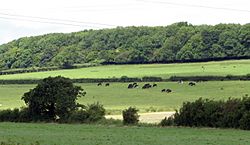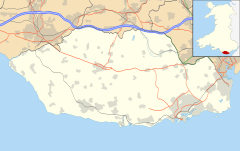Goldsland facts for kids
Quick facts for kids Goldsland
|
|
|---|---|
 Cattle in a field, looking across to Goldsland Wood |
|
| Principal area |
|
| Ceremonial county | |
| Country | Wales |
| Sovereign state | United Kingdom |
| Postcode district | CF |
| Police | South Wales |
| Fire | South Wales |
| Ambulance | Welsh |
| EU Parliament | Wales |
| UK Parliament |
|
| Welsh Assembly |
|
Goldsland (also known as Tregold in Welsh) is a small village and farm area in south Wales. It's located in the Vale of Glamorgan, close to the Wenvoe Castle Golf Club. Goldsland is found east of Dyffryn and south of St Lythans. A small stream called Goldsland Brook flows through this area.
Contents
Goldsland Farm: A Look at History
The most important building here is the Goldsland Farmhouse. It has a farmyard that was planned out in the early to mid-1800s. There is also a large barn with two big doors. The farmhouse is made from stone and has a roof of Welsh slate. This farm used to provide milk to the Jenners, a family who lived at nearby Wenvoe Castle.
This farm was once famous for its amazing animals! In 1870, a farmer named E. Thomas won a prize for the "Best Pair of Sows" (female pigs). This award was given by the Glamorganshire Agricultural Society. Later, in 1893, the farm owner, Lewis Jones, had a horse that won first place at the Glamorganshire Show. It also won first place at the Cardiff Horse Show in 1894.
Goldsland Wood and Its Caves
Goldsland Wood is a forest located northwest of the farmhouse. It is a deciduous woodland, meaning its trees lose their leaves in autumn. This wood sits on a low ridge of limestone that stretches for about 2.5 kilometers. You can find malachite, a green mineral, in this area.
Exploring the Goldsland Caves
There are several caves in the ridge area that have been explored by scientists. Since 2005, the University of Central Lancashire has led the Goldsland Caves Research Project. This project aims to learn about the age of the materials found in the caves. They also study how the cave deposits were formed. Scientists hope to find clues about the environment long ago. They are especially looking for signs of human use of the caves. This includes the Palaeolithic (Old Stone Age) and Holocene periods. They also look for signs that the caves were used for burials.
Archaeologists have made exciting discoveries in these caves. They have found human remains and tools made from flint from the Mesolithic (Middle Stone Age) and Neolithic (New Stone Age) periods. They also found pottery from the Neolithic age. The main Goldsland cave is located at 51°26′21″N 3°17′00″W / 51.439062°N 3.283293°W.
Dr. Rick Peterson, who leads the archaeological project, shared some interesting facts. He said the pottery and a flint saw-blade suggest the remains are from around 3000 BC. This means they are over 5000 years old! The team also found a smaller pit with ash from a cremation fire. However, there was little sign of the body itself. Other human remains have been found in caves from the Neolithic period. But the Goldsland caves had never been explored before. Dr. Peterson said they hoped to find undisturbed evidence of ancient rituals. It seems they found what they were looking for!
Images for kids
 | William L. Dawson |
 | W. E. B. Du Bois |
 | Harry Belafonte |





